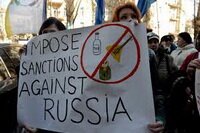
In response to Russia's actions towards Ukraine threatening both, the global security architecture, and, in particular, the Euro-Atlantic community, values and principles of the United Nations, the United States and the European Union have announced the launch of the first phase of sanctions against Moscow, pointing out at this, that if President Vladimir Putin does not take necessary steps to resolve the current crisis through diplomatic channels, they, these sanctions, will be expanded.
Moreover, despite all sorts of damage to national business, German Chancellor Angela Merkel has warned Russia that if it does not give up military aggression against Ukraine, the European Union will use a three-level plan sanctions. There are similar warnings also from the U.S. administration, ready for the three-level economic impact on the Russian oligarchs supporting Putin 's imperial ambitions.
At the meeting in Brussels, the EU leaders decided to stop negotiations with Russia on trade and visa liberalization. This is the first of three possible packages of measures, prepared by the European Union for the Russian government in protest against its current policy towards Ukraine. If negotiations with the Kremlin end to no avail and will be used by it only for tightening time, March 17 Foreign Ministers of the EU countries will move to the second phase — in particular, will block accounts and deny visas to Russians, directly related to the escalation of the crisis in Ukraine and encroachment on its territorial integrity. This was strongly stated by German Chancellor Angela Merkel and French Foreign Minister L. Fabius.
The USA, apart from visa restrictions and freezing of accounts of individuals, may impose sanctions against Russian banks with further isolation of Russia from the dollar system. As the third measure, Barak Obama's administration is preparing to use against Moscow developed after the September 11 terrorist attacks (2001) international legal instruments for struggle against arms smuggling and money laundering. The U.S. Treasury has been considering Russia for a long time as one of the centers of the global arms trade and illegal business related to organized crime.
Particularly revealing in this regard is the Viennese operation of the Federal Criminal Police of Austria's detention of the 48 -year-old Ukrainian citizen Dmitry F., conducted on the basis of a warrant issued at the request of the FBI. Russian oligarchs and politicians should think about “personal price” of Putin’s aggression and voluntarism.
Intervention in Ukraine of the Russian Federation has already led to the fact that Russia has suffered significant long-term economic losses. For example, fluctuations in the currency market in Russia can be felt, the cost of leading Russian stocks is decreasing, ruble depreciates. Its stabilization requires large foreign exchange interventions for a long time, but this the Central Bank of Russia is not able to do. In Economic Council under the President of the Russian Federation, they recognize that it is already possible to talk about reducing lending to Russian companies by foreign banks. And all this- despite the fact that the corporate sector of Russia has lent from foreign banks about 700 billion US dollars. The USA and European Union’s sanctions against Russia may lead to an additional outflow from the Russian economy of 50 billion US dollars quarterly.
Henchmen of the plans for annexation of the Crimea and attacks on the South- Eastern regions of Ukraine, should remember about the vulnerability of Russian financial markets, and that over 70% of the free reserves of the Moscow Stock Exchange are owned by foreign entities, which also own up to 30% of government bonds and using Eurobonds are largely financing the Russian company. Economic war with the West over Ukraine will make a powerful blow to Russia, 40 % of goods on the domestic market of which are imported.
So, the sanctions will provoke new challenges for macro-economy and investments into the economy. And not only foreign investments — they will have an impact on the Russian domestic investor, on the general mood of the Russian population.
If Russia chooses the variant of sharpening the crisis, the international community, like during Iraq 's invasion into Kuwait in 1990 with its subsequent annexation, will have to make clear to the Russian side that it has a price: in such circumstances, Moscow risks to find itself in international isolation.
If Russia chooses the variant of sharpening the crisis, the sanctions can be exactly like those which once were imposed against Iran. They will include freezing overseas foreign exchange reserves and bank assets of Russia, ending its lending and other tough international measures- political, economic and informational ones. If Moscow chooses such a scenario, it will mean that will come into effect the already approved tools of economic suppression of Shiism and mullahcracy, which is sure to loosen the internal political unity of the Putin regime.
If Russia is able to make proper historical conclusions, then Ukraine, with unprecedented support from the international community, is ready to resolve the conflict according to the criteria of the XXI century — peacefully and through diplomacy.






